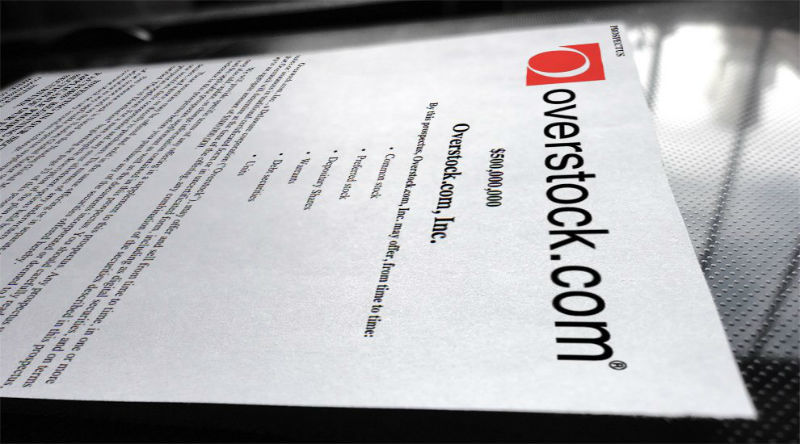Digital Securities: How Blockchain Will Change the Future of Stock Trading

In December 2015, the US Securities Commission (SEC) approved the application of the company Overstock.com to issue shares via the Internet - that is, digital shares (digital securities). According to many experts and media representatives, this event in the future may undermine the dominant position of Wall Street financial companies, as well as make the process of entering the IPO more accessible to small companies (how we have organized it we have recently written ).
What it is
Over the past year, Overstock Inc, under the leadership of its CEO Patrick Byrne, has developed a method for issuing shares using Blockchain technology, on the basis of which Bitcoin cryptocurrency operates. Digital shares are understood as “non-documentary, registered securities, the ownership of which and the fact of their transfer are certified by making an entry in a protected publicly accessible register”. The reliability of public copies of this register can be mathematically confirmed using Blockchain technology.
')
According to the documentation of Overstock Inc., the company plans to place various "classic" securities (stocks and bonds), including in the form of digital securities. Earlier, Overstock has already placed private bonds, which did not require regulatory approval. Now SEC has allowed the company to issue public financial instruments in the same way.

Overstock plans to use its technology as a service, allowing various companies to issue shares and attract funding without the need to enter the traditional stock market. At the first stage, each such company will require a separate regulator permission, but Overstock has the right to offer technology for issuing shares of third companies even before it releases its own.
Work features
At the current stage, two interesting points can be noted in the Overstock technology scheme described. First of all, the documentation states that in the event of a conflict between copies of the decentralized register of transactions, the priority will be the copy supported by the company's platforms (ATS). In the traditional Bitcoin paradigm, this is not possible - it is based on the principle of consensus, according to which decisions are made by a majority, and none of the participants in the network have a decisive vote.
In addition to the users themselves, Overstock, the ATS platform and the DriveWealth dealer, through which the securities are planned to be placed on the ATS platform, will also have access to the secret keys of the security holders. Thus, in contrast to cryptocurrency, when using digital shares, the anonymity of the buyer and the seller is out of the question.
How does this threaten Wall Street
Bern is convinced that his technology "can do for the financial market the same thing that the Internet has done for buyers." It will allow companies to get a reliable, safe and transparent way to automatically track who exactly owns their shares at a particular point in time. According to the entrepreneur, his system will one day be able to replace the trading floors of the New York Stock Exchange and the Nasdaq.
For trading in digital shares, Overstock wants to create a separate trading system (ATS, alternative trading system), which will obey the SEC rules. In 2014, Bern announced his intention to create a decentralized trading platform called Medici. With its help, it will be possible to trade in crypto stocks issued by Overstock itself and other companies. In May 2015, Overstock bought a 25% stake in PRO Securities, which is developing an alternative trading system of the same name.
As planned by Bern, his project will help remove from the process of buying shares of various intermediaries who have always ruled the ball in the market. In addition, Blockchain technology should allow closing many of the weaknesses of today's financial market. As Bern said in a conversation with the publication Wired: "Today there are many ways to deceive the market, we want to make this impossible." The important point here will be the fact that the buyer of securities will be able to learn the whole history of their ownership.
Also for the American and European stock exchanges is the traditional scheme in which the delivery of purchased securities is carried out on the third day after the transaction - it is called T + 3. The Overstock technology is called tØ, which hints at the fact that the registration of ownership of the acquired shares will be carried out on the same day.
Possible problems
The emergence of a decentralized trading platform for trading digital shares raises concerns among some representatives of the financial market. Many of them are worried that in this scheme there is no clearing process, that is, confirmation of a transaction authorized by the organization. The history of Bitcoin suggests that these concerns will not be confirmed in practice, since the mining technology allows you to reliably confirm transactions. In addition, the absence of a clearing organization will save users from having to pay the appropriate commissions.
However, not once or twice on bitcoin exchanges there were failures and various problems that left users without their money in the end. Cryptocurrency in itself can be a completely protected tool, but the owners of such currency can be protected very weakly.
In addition, although this is a rather funny moment, the process of transferring cryptoshares from the holder to the holder may actually be slower than in the traditional stock market. Today's trading systems of the exchanges work very efficiently and allow you to carry out transactions almost instantly. In the case of a distributed system, it can take up to several minutes to fully confirm it - but unlike traditional markets with their T + 3 scheme, in the case of digital shares, they will be delivered instantly.
At the moment, it is quite difficult to predict the fate of initiatives like Overstock, in the USA and even more so in other countries, for example in Russia. As for our country, the cryptocurrency itself and the technologies by which they work are not prohibited in our country, and no laws have yet been introduced to penalize the use of such “money substitutes”. However, the likelihood of using new financial technologies in our market will largely depend on how successful the experience of the pioneers is.
Source: https://habr.com/ru/post/371623/
All Articles